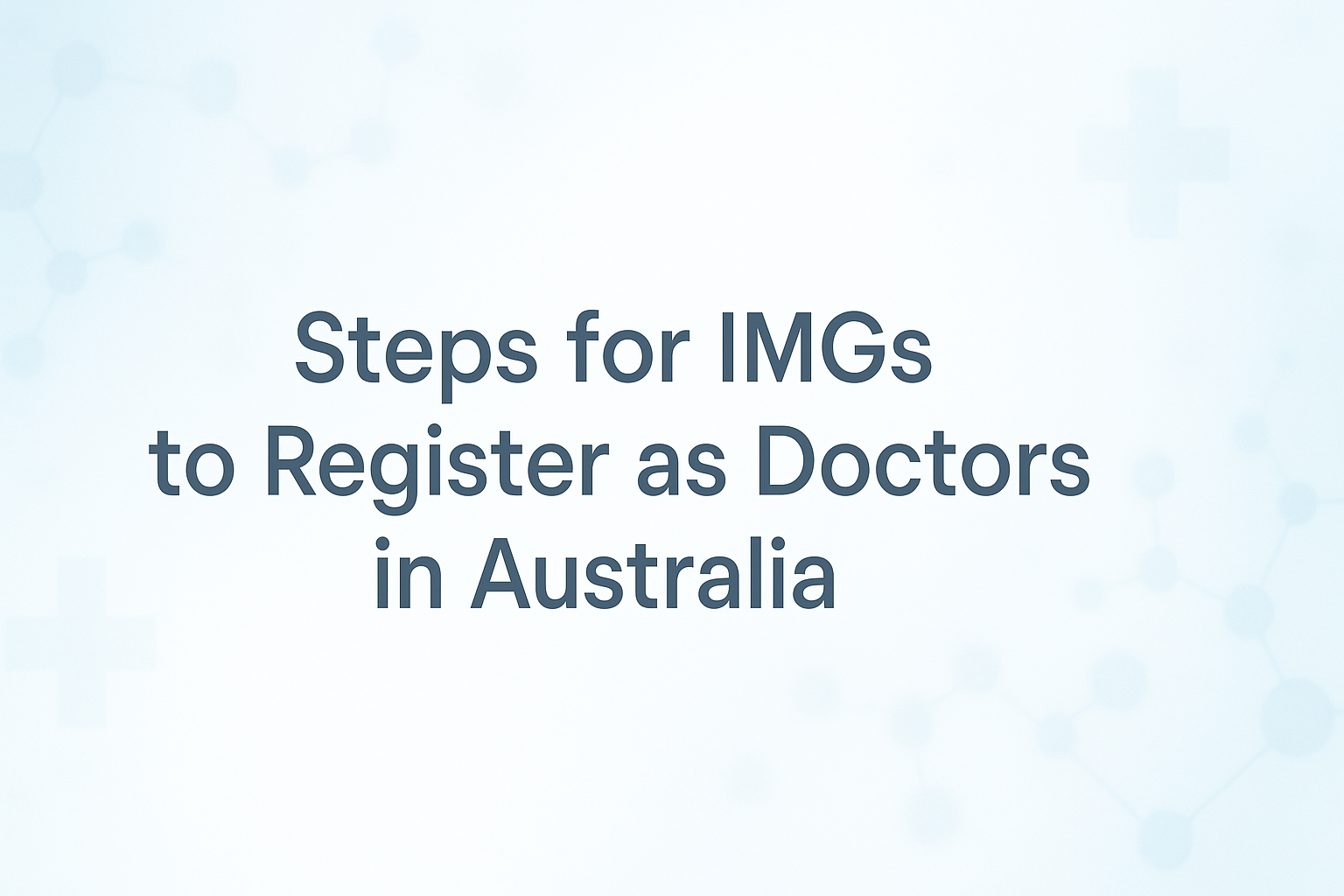Registration & Pathways
Steps for IMGs to Register as Doctors in Australia
To be eligible to work in Australia, international medical graduates (IMGs) must ultimately register with the Australian Health Practitioner Regulation Agency (AHPRA).
This article summarizes the requirements for registration with AHPRA.
※This article is written by OET Bank, where we specialize in helping healthcare professionals prepare for OET and support their overseas career opportunities.
About Pathways
For those who did not graduate from medical schools in Australia or New Zealand, there are four main routes to AHPRA registration. These are referred to as “Pathways”:
- Competent Authority Pathway
- Standard Pathway
- Specialist Pathway
- Short-Term Training in a Medical Specialty Pathway
The appropriate pathway depends on the candidate’s qualifications and experience. For permanent practice in Australia, candidates usually pursue either the Standard Pathway or the Specialist Pathway (the Competent Authority Pathway is rarely an option for IMGs).
1. Competent Authority Pathway
This pathway applies to candidates who obtained their primary medical qualification in specific countries, including the United Kingdom, Canada, the United States, New Zealand, and Ireland. These applicants are exempt from the AMC written examination and can proceed directly to the clinical exam.
For most IMGs, this pathway is not applicable.
2. Standard Pathway
This is the most common route for IMGs who wish to register in Australia. Candidates must pass both the written and clinical examinations conducted by the Australian Medical Council (AMC).
It applies to graduates from countries not listed under the Competent Authority Pathway, as well as those without specialist recognition.
3. Specialist Pathway
This pathway is designed for overseas-trained specialists who already hold recognized specialist qualifications and wish to practice in that specialty in Australia.
Applicants are assessed by the relevant Australian specialist medical college. Depending on the evaluation, they may be allowed to register in their specialty. Assessment criteria and processes vary by specialty.
4. Short-Term Training in a Medical Specialty Pathway
This pathway is intended for overseas-trained specialists who are not seeking permanent specialist registration in Australia but want short-term training (typically up to 12 months).
While this does not lead to permanent registration, candidates may later transition to the Specialist Pathway after completing their training.
In summary:
- IMGs without specialist qualifications typically pursue the Standard Pathway and pass the AMC exams.
- IMGs with specialist qualifications may go through the Specialist Pathway or Short-Term Training Pathway, depending on their goals.
English Language Requirements
Regardless of the chosen pathway, candidates must demonstrate English proficiency through one of the following:
- IELTS: Overall 7.0, L 7.0+, R 7.0+, W 6.5+, S7.0+
- OET: L 350+, R 350+, W 300+, S 350+
- TOEFL iBT: Total 94, with L 24+, R 24+, W 24+, S 23+
- PTE Academic: Overall 66+, L 66+, R 66+, W 56+, S 66+
Reference: English language skills registration standards
⚠️ Note: AHPRA accepts test-center internet-based tests (IBT), but does not accept at-home versions.
IELTS
One of the most widely used international English tests. Key features include:
- Writing tasks often involve describing data or qualifications.
- Speaking is conducted face-to-face.
Because of the wide range of topics, preparation cannot rely solely on templates. For many IMGs, achieving 6.5+ in Speaking is particularly challenging.
OET
The Occupational English Test is designed for healthcare professionals, including doctors and nurses.
- Graded from A (high) to E (low).
- Writing and speaking tasks are based on medical scenarios, making it more accessible for healthcare candidates.
However, many IMGs struggle with Listening, as topics often involve internal medicine or surgery.
TOEFL
Another globally recognized exam, fully computer-based.
- Scored out of 120 (30 per section).
- Strong listening skills are essential since all sections except Reading involve listening components.
- Achieving 24+ in Writing is a common barrier for many candidates.
PTE
A computer-based exam primarily recognized in Australia and New Zealand.
- Scores range from 10 to 90.
- Speaking and writing are assessed together.
- Results are typically available within 5 days.
Some candidates report difficulties when the system misinterprets their speaking voice, leading to unexpectedly low scores.
In short, no exam is “easier.” All require strong vocabulary, reading comprehension, and listening skills as a foundation. Early and consistent preparation is highly recommended.
AMC Examinations
For IMGs pursuing the Standard Pathway, the AMC exams are mandatory. They consist of:
- AMC MCQ Examination (Written)
- AMC Clinical Examination
These are comparable to USMLE Step 1 and Step 2 CK, testing both knowledge and clinical reasoning.
1. AMC MCQ Examination
- Computer-based multiple-choice test (150 questions)
- Duration: ~3.5 hours
- Topics: Internal Medicine, Surgery, Pediatrics, Obstetrics & Gynecology, and more
- Test centers available in Australia and internationally, including Tokyo and Osaka
2. AMC Clinical Examination
- Practical assessment with 16 stations (role-play with simulated patients)
- Each station: 2 minutes reading, 8 minutes testing
- Skills assessed: clinical reasoning, communication, professionalism, examination techniques
- Pass rate: around 30%, making it highly competitive
Always confirm the latest exam details before preparing:
AMC Clinical Examination Specifications (2021)
Conclusion
To register as a doctor in Australia, international medical graduates must:
- Select the appropriate Pathway based on qualifications and career goals
- Prove English proficiency under the English language skills registration standards
- Undergo assessment processes required by their chosen pathway
Ultimately, demonstrating English proficiency is the baseline requirement. Those aiming to work abroad should steadily build language skills well in advance.
In future articles, we will provide detailed guidance on AHPRA applications and pathway-specific requirements.
Study with OET BANK
Stop wasting time comparing OET materials.
With OET BANK, you get:
- Premium-quality OET materials, built by professionals
- A focused, efficient study path — no unnecessary content
- A system designed to help you pass OET once — without trial and error
If you want to prepare properly and pass with confidence,
you don’t need to look anywhere else.
Pick your materials and start today — with OET BANK.




